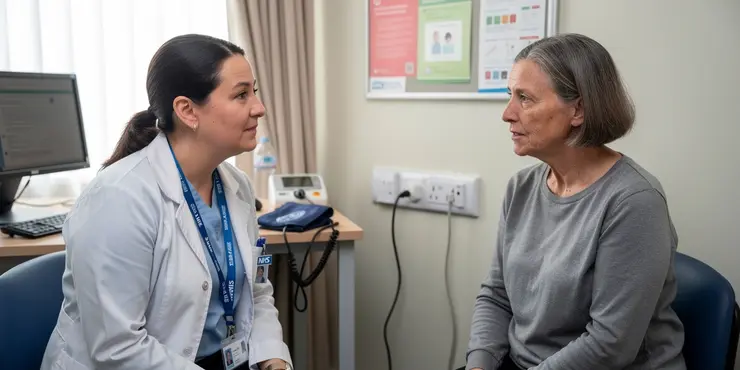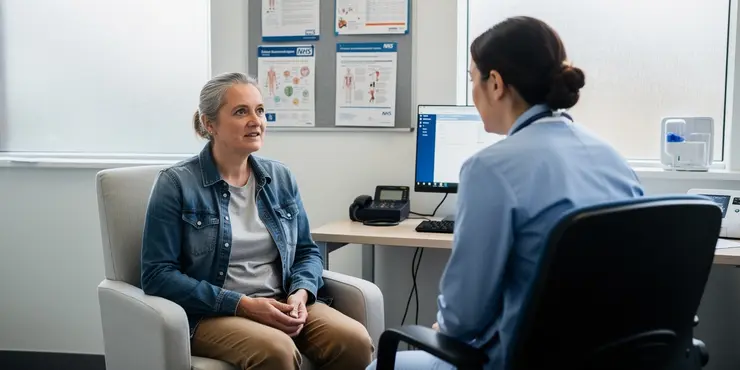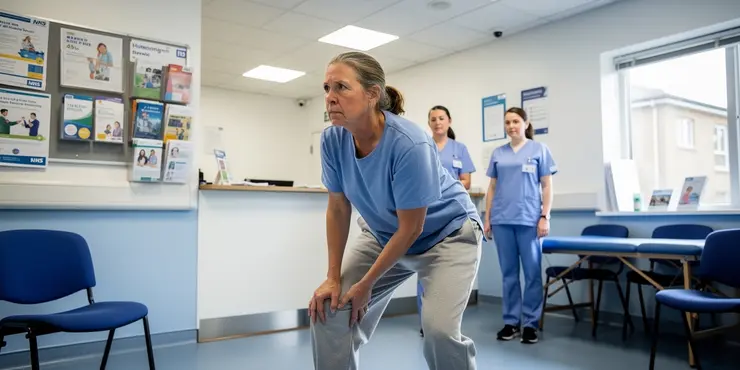
Find Help
More Items From Ergsy search
-

How does CFS differ from regular fatigue?
Relevance: 100%
-

Can CFS be prevented?
Relevance: 69%
-
What is chronic fatigue syndrome?
Relevance: 63%
-

What is the prognosis for someone with CFS?
Relevance: 61%
-

Are there psychological aspects to chronic fatigue syndrome?
Relevance: 60%
-

Is chronic fatigue syndrome contagious?
Relevance: 59%
-
Can children develop chronic fatigue syndrome?
Relevance: 58%
-

How does post-exertional malaise relate to CFS?
Relevance: 58%
-

Can CFS symptoms fluctuate over time?
Relevance: 57%
-

Who is at risk of developing chronic fatigue syndrome?
Relevance: 57%
-

What role do infections play in chronic fatigue syndrome?
Relevance: 56%
-

How is chronic fatigue syndrome treated?
Relevance: 56%
-

Why is it important to increase awareness about CFS?
Relevance: 55%
-

Does physical exercise help people with CFS?
Relevance: 55%
-

What causes chronic fatigue syndrome?
Relevance: 51%
-
Is chronic fatigue syndrome a mental illness?
Relevance: 46%
-

Is there a cure for chronic fatigue syndrome?
Relevance: 39%
-

How is chronic fatigue syndrome diagnosed?
Relevance: 38%
-

Can chronic fatigue syndrome be managed with lifestyle changes?
Relevance: 37%
-

Can fatigue result in dangerous driving?
Relevance: 36%
-
Can weight loss medications cause fatigue?
Relevance: 34%
-

What are the benefits of regular mammograms?
Relevance: 30%
-

Should I change my passwords regularly?
Relevance: 30%
-

Myalgic encephalomyelitis or chronic fatigue syndrome (ME/CFS) | NHS
Relevance: 29%
-
Are sugar substitutes healthier than regular sugar?
Relevance: 26%
-

How does regular caffeine consumption impact tolerance and blood pressure?
Relevance: 25%
-

Can you wear regular clothing with a stoma bag?
Relevance: 25%
-

Are there risks associated with taking aspirin regularly?
Relevance: 24%
-

Why is regular health monitoring important for drivers over 70?
Relevance: 23%
-

How can I stay motivated to walk to work regularly?
Relevance: 23%
-

Can Ozempic cause fatigue?
Relevance: 21%
-

Are heart attack symptoms different for people with diabetes?
Relevance: 12%
-

What types of exercise are beneficial for bowel cancer patients?
Relevance: 12%
-

What are the common symptoms of lupus in children?
Relevance: 12%
-

What are the common side effects of Abiraterone?
Relevance: 12%
-

Are there specific benefits of exercise for bowel cancer survivors?
Relevance: 11%
-

Royal Berkshire NHS Foundation Trust: Radiotherapy for head and neck cancers
Relevance: 11%
-
Leukaemia: What are the signs and symptoms? | NHS
Relevance: 11%
-
Are there any symptoms of type 1 diabetes I should watch for in my child?
Relevance: 11%
-

What are the common side effects of Ozempic?
Relevance: 10%
Understanding Chronic Fatigue Syndrome (CFS)
Chronic Fatigue Syndrome (CFS), also known as Myalgic Encephalomyelitis (ME), is a complex and long-term illness that significantly impacts the lives of those affected. CFS differs from regular fatigue due to its severity, persistence, and the accompanying symptoms that are not explained by other medical conditions.
Characteristics of Regular Fatigue
Regular fatigue is a common experience associated with the physical and mental exertion of daily life. It can typically be alleviated by rest and sufficient sleep. Factors contributing to regular fatigue include stress, lack of sleep, poor diet, and sedentary lifestyle. Most individuals will feel rejuvenated after taking time to rest or change their daily habits. Regular fatigue is considered a temporary and natural response to the demands of daily life.
Symptoms and Diagnosis of CFS
In contrast, CFS presents with profound exhaustion not improved by rest and can be debilitating. Diagnosis of CFS is often challenging and based on specific criteria, including persistent fatigue lasting longer than six months, which is not relieved by rest and severely impacts daily functioning. Key symptoms also include difficulties with memory and concentration, sleep disturbances, muscle or joint pain, headaches, and sore throat.
Diagnosis involves ruling out other potential causes of fatigue. This can include tests to eliminate medical conditions such as anaemia, thyroid issues, and depression. The variety and severity of symptoms, coupled with a lack of definitive diagnostic tools, require healthcare professionals to rely heavily on patient history and symptom reporting.
Impact on Lifestyle and Treatment
CFS can significantly impair a person’s ability to perform daily activities, with many individuals finding it difficult to maintain employment, pursue education, or engage in social activities. Physical or mental exertion can exacerbate symptoms, a phenomenon known as "post-exertional malaise". This means that even minimal effort can lead to a worsening of symptoms, lasting for days or weeks.
Treatment for CFS focuses on symptom management as there is currently no cure. Patients work with healthcare providers to develop tailored plans that might include medications for pain and sleep issues, physical therapy to help improve mobility, and cognitive behavioural therapy to support mental health. Lifestyle adjustments, such as pacing activities, establishing a regular sleep routine, and dietary changes, can also be beneficial.
Conclusion
Understanding the differences between CFS and regular fatigue is crucial for effective diagnosis and management. While regular fatigue is a temporary state alleviated by rest, CFS is a chronic condition with complex symptoms requiring comprehensive management. Raising awareness and providing support for those affected by CFS can significantly improve quality of life and assist in navigating the challenges of this condition.
Understanding Chronic Fatigue Syndrome (CFS)
Chronic Fatigue Syndrome, or CFS, is a long-lasting illness. It is also called ME. It makes people very tired and affects their daily lives. This tiredness is different from normal tiredness. It is more serious and does not get better with rest. People with CFS have other symptoms too, and these are not explained by other health problems.
Characteristics of Regular Fatigue
Regular tiredness happens to everyone. It can come from doing lots of activities or thinking hard. You can feel better by resting and sleeping well. Stress, not sleeping enough, eating badly, and not moving much can make you tired. Most people feel better after resting or changing what they do every day. This kind of tiredness is normal and does not last long.
Symptoms and Diagnosis of CFS
CFS is different because the tiredness does not get better with rest. It can be very hard to live with. To find out if someone has CFS, doctors look for tiredness that lasts more than six months and makes it hard to do daily activities. Other symptoms include trouble remembering things, not being able to concentrate, not sleeping well, muscle or joint pain, headaches, and sore throat.
Doctors have to check if there are other reasons for the tiredness. They may do tests to rule out problems like anaemia, thyroid issues, and depression. This process can be hard because the symptoms vary and there is no simple test for CFS. Doctors depend a lot on what patients tell them about their symptoms.
Impact on Lifestyle and Treatment
CFS makes it difficult for people to do everyday activities. It can be hard for them to work, study, or see friends. Doing any kind of activity can make symptoms worse, a problem called "post-exertional malaise." This means even small actions can make people feel worse for days or weeks.
There is no cure for CFS, so treatment focuses on making symptoms better. Doctors and patients work together to create a plan. This may include medicine for pain and sleep, exercises to help with movement, and talking therapies to support mental health. Changing how people live, like spreading out activities, keeping a sleep routine, and eating well, can also help.
Conclusion
Knowing the difference between CFS and regular tiredness is important for finding the right treatment. Regular tiredness goes away with rest, but CFS is a long-term illness with many difficult symptoms. Helping people understand and manage CFS can make a big difference in their lives.
Frequently Asked Questions
What is Chronic Fatigue Syndrome (CFS)?
CFS, also known as myalgic encephalomyelitis (ME), is a long-term illness characterized by severe fatigue that doesn’t improve with rest and worsens with physical or mental activity.
How does CFS differ from regular fatigue?
Regular fatigue is temporary and typically resolves with rest or reduced activity, while CFS is a chronic condition that leads to persistent and unexplained fatigue not alleviated by rest.
What are the main symptoms of CFS?
CFS symptoms include severe fatigue, sleep problems, cognitive difficulties, muscle and joint pain, headaches, and increased sensitivity to light, noise, and temperature.
Can stress cause CFS?
Stress alone is unlikely to cause CFS, although it can exacerbate symptoms. CFS is believed to result from a combination of genetic, environmental, and possibly infectious factors.
Is there a diagnostic test for CFS?
There is no specific diagnostic test for CFS. Diagnosis is made based on symptom criteria and by ruling out other conditions that cause similar symptoms.
How long does CFS last?
CFS can last for months to years. The duration varies among individuals, with some experiencing periods of remission and others having persistent symptoms.
Are there treatments available for CFS?
While there is no cure for CFS, treatment focuses on symptom management, which may include medications, cognitive behavioral therapy, and lifestyle adjustments to avoid symptom triggers.
Can physical activity help with CFS?
While regular fatigue may improve with physical activity, CFS symptoms can worsen with exertion, a phenomenon known as post-exertional malaise. A carefully managed and personalized approach to activity is recommended.
What is post-exertional malaise (PEM)?
PEM is a hallmark of CFS, characterized by a worsening of symptoms following physical or mental exertion, often delayed by hours or days.
Is CFS more common in any specific population?
CFS is more commonly diagnosed in women, typically affects individuals in their 40s and 50s, and can impact people of all races and socioeconomic backgrounds.
Does CFS affect mental health?
CFS can have a significant impact on mental health, leading to symptoms such as depression and anxiety due to the chronic nature of the illness and the limitations it imposes on daily life.
Is CFS a psychological disorder?
CFS is not considered a psychological disorder, although it can have psychological effects. It is a complex, multi-system disease that affects the physical and mental health of individuals.
Can diet influence CFS symptoms?
Some people with CFS report that certain dietary changes, such as reducing sugar or caffeine intake and ensuring balanced nutrition, can help manage their symptoms. However, individual responses vary.
Is sleep helpful for managing CFS?
While people with CFS often experience sleep disturbances, improving sleep quality can help manage symptoms, though it may not fully alleviate fatigue.
What other illnesses can mimic CFS?
Conditions such as fibromyalgia, lupus, multiple sclerosis, and sleep disorders can mimic CFS symptoms, making differential diagnosis crucial.
Are there any known risk factors for developing CFS?
Some risk factors for CFS include genetics, viral infections, immune system changes, and physical or emotional trauma.
How does CFS impact daily life?
CFS can severely impact daily life by limiting physical and mental activities, leading to reduced participation in work, social activities, and personal relationships.
Can children and teenagers develop CFS?
Yes, CFS can affect children and teenagers, and the symptoms are similar to those in adults, although diagnosis and management may be different for younger populations.
How is CFS managed in the long term?
Long-term management of CFS involves pacing activities, managing stress, maintaining a healthy diet, getting adequate rest, and addressing specific symptoms as they arise.
What is the prognosis for someone with CFS?
The prognosis for CFS varies. Some people may experience improvements over time, while others may have persistent symptoms. Early diagnosis and comprehensive management can improve outcomes.
What is Chronic Fatigue Syndrome (CFS)?
Chronic Fatigue Syndrome, or CFS, is an illness. It makes you feel very tired all the time. Rest or sleep does not make it better. Tools to help: - Use picture cards to understand and remember information. - Break information into small and simple steps. - Ask someone to read and explain with you.CFS, or ME, is a sickness that lasts a long time. It makes people feel very tired. Resting or sleeping does not help this tiredness. When people with CFS do things, like playing or thinking, they feel even more tired.
What makes CFS different from normal tiredness?
Sometimes, people feel tired. This type of tired feeling usually goes away when you rest or do less work.
But, some people have a condition called CFS. This means they feel very tired all the time for a long time. Resting does not help them feel better.
What are the main signs of CFS?
CFS stands for Chronic Fatigue Syndrome. It makes you feel very tired.
Here are some signs you might have CFS:
- Feeling very tired all the time, even after sleep.
- Problems with your memory or thinking clearly.
- Pain in muscles or joints without swelling.
- Headaches that are different or worse than usual.
- Feeling dizzy or sick after standing up.
These signs can make it hard to do daily activities.
Having a plan can help. You can:
- Write down how you feel in a diary.
- Rest often, but not all the time.
- Ask your doctor for help.
- Use pictures or charts to remember things.
These tools can support you in managing CFS.
CFS symptoms are:
- Feeling very tired.
- Trouble sleeping.
- Problems with thinking and remembering.
- Sore muscles and joints.
- Headaches.
- Feeling extra bothered by bright lights, loud sounds, or changes in temperature.
To help, you can:
- Use simple reminders or notes to help remember things.
- Use earplugs or sunglasses to feel better with noise and light.
- Try to do relaxing activities before bed to sleep better.
Can stress make you tired all the time?
Being stressed probably won't cause CFS by itself, but it can make the symptoms worse. CFS might happen because of a mix of genes, the things around us, and maybe infections too.
Is there a test for CFS?
CFS stands for Chronic Fatigue Syndrome. It makes you feel very tired.
There is no single test to find out if you have CFS.
Doctors can help by asking questions and checking your health.
If you feel very tired and it does not get better, talk to a doctor.
You can use pictures or talk to someone for support.
There isn't a special test to find out if someone has CFS (Chronic Fatigue Syndrome). Doctors figure out if someone has CFS by checking their symptoms and making sure it's not something else causing those symptoms.
How long does CFS last?
CFS stands for Chronic Fatigue Syndrome. It is a sickness that makes you very tired.
Some people with CFS feel tired for a short time. Other people feel tired for a long time. It can be different for everyone.
If you have CFS, it is important to see a doctor. They can help you feel better.
There are things that can help, like:
- Resting when you are tired.
- Eating healthy food.
- Doing gentle exercises.
- Talking to others who have CFS.
CFS, or Chronic Fatigue Syndrome, can last a long time. It can last months or even years. Everybody is different. Some people get better for a while, but others feel tired all the time.
Can doctors help if you have CFS?
If you have CFS, doctors can help you feel better. They might give you medicine or show you exercises. You can also learn ways to rest and feel less tired.
Remember to talk to your doctor for help. You can also ask someone to go with you to the doctor. Writing down your questions can help too!
There is no cure for CFS, but doctors can help with the symptoms. The help can include medicines, talking to someone to help our thoughts and feelings, and changing our daily habits to stop symptoms from happening.
Does moving your body help if you have CFS?
CFS stands for Chronic Fatigue Syndrome. It makes people feel very tired.
Moving your body, like walking or stretching, can help some people feel better. But everyone is different. Try to do a little activity every day, if you can.
If moving makes you feel worse, talk to a doctor. They can help you find the right amount of activity.
Using a tracker or a diary to write down how you feel each day can help. It shows you what works best for your body.
When you feel tired from normal things, moving your body may help you feel better. But if you have CFS, moving too much can make you feel worse. This is called post-exertional malaise. It's important to have a plan that works just for you to manage how much you do.
What is post-exertional malaise (PEM)?
When you feel very tired or unwell after doing something, that is called post-exertional malaise (PEM). Even small activities can make you feel like this. Rest and taking breaks can help. A diary can help track how activities affect you. Talk to a doctor if you have more questions.
PEM is an important sign of CFS. It means feeling worse after doing things like exercising or thinking hard. This can happen a few hours or days later.
Do some groups get CFS more often?
CFS is more common in women. It usually affects people between 40 and 50 years old. It can happen to anyone, no matter what race or how much money they have.
Can CFS make you feel sad or worried?
CFS can make your mental health not feel good. It can cause sadness and worry. This happens because CFS lasts a long time and makes it hard to do things every day.
Is CFS a mind problem?
CFS is not a mental illness, but it can affect how you feel and think. It is a complicated illness that changes the body and mind.
Can what we eat change how CFS makes us feel?
Some people with CFS (Chronic Fatigue Syndrome) find that changing what they eat can help. Eating less sugar and caffeine and having a balanced diet might help them feel better. But everyone's different, so it might not be the same for everyone.
Does sleep help with CFS?
Getting enough sleep can help people feel better.
CFS stands for Chronic Fatigue Syndrome. It makes people very tired.
Sleeping well can help your body rest and feel less tired.
Here are some tips to help with sleep:
- Go to bed at the same time every night.
- Wake up at the same time every morning.
- Make your bedroom quiet and comfortable.
- Try not to use screens, like phones or tablets, before bed.
- Relax before bed, maybe with a bedtime story or calm music.
If you have CFS, it can be hard to sleep well. Sleeping better can help you feel a little better, but you might still feel tired.
What other illnesses look like CFS?
CFS means Chronic Fatigue Syndrome. It makes people very tired.
There are other illnesses that can feel the same:
- Depression: This can make you feel very tired and sad.
- Sleep Disorders: Not sleeping well can make you tired during the day.
- Anemia: This means you don't have enough red blood cells, and it makes you feel tired.
- Thyroid Problems: Your thyroid helps control energy. If it's not working right, you can feel tired.
- Infections: Sometimes being sick with an infection can make you feel very tired.
If you feel very tired, it's good to talk to a doctor.
You can also try these things to help:
- Rest and sleep when you need to.
- Eat healthy foods like fruits and veggies.
- Do light exercises, like walking, if you can.
Some illnesses can look like CFS. These include fibromyalgia, lupus, multiple sclerosis, and sleep problems. It is important for doctors to figure out which one it is.
What can make someone more likely to get CFS?
Some things that might make CFS happen are:
- Your genes – like what you get from your parents.
- Getting sick with a virus, like the flu.
- Changes in your body's defense system, called the immune system.
- Getting hurt or feeling very stressed or upset.
If you find reading hard, using audiobooks or text-to-speech software can help. You can also take breaks and read a little bit at a time. Talking about what you read with someone else can also make it easier to understand.
How does being very tired affect daily life?
CFS can make daily life very hard. It can make it tough to do physical and mental activities. This means people might not be able to work, hang out with friends, or spend time with family like they used to.
Can kids and teens get CFS?
Yes, kids and teens can get CFS. CFS stands for Chronic Fatigue Syndrome. It makes you feel super tired all the time. If you think your child is very tired, it's good to talk to a doctor.
Some helpful tips:
- Get plenty of sleep
- Eat healthy food
- Do some gentle exercise
- Take breaks when needed
If you need help, ask a teacher, friend, or doctor.
Yes, kids and teenagers can have CFS. That means they feel very tired a lot. They have the same signs as adults, but doctors can look after kids with CFS in a different way.
How do you handle CFS for a long time?
Taking care of CFS for a long time means doing some important things: doing activities slowly, staying calm, eating healthy food, getting enough sleep, and taking care of any problems that come up.
What will happen to someone with CFS?
CFS stands for Chronic Fatigue Syndrome. It means feeling very tired for a long time.
Everyone with CFS is different. Some people get better after a while. Others might still feel tired.
It's good to:
- Rest when you need to.
- Talk to your doctor.
- Eat healthy food.
- Try gentle exercises, like walking.
These can help you feel a bit better.
CFS means Chronic Fatigue Syndrome. How a person gets better with CFS can be different for each person. Some people might start to feel better after some time. But other people might still feel unwell for longer. Getting help from a doctor early and following a plan to manage CFS can help people feel better.
Useful Links
This website offers general information and is not a substitute for professional advice.
Always seek guidance from qualified professionals.
If you have any medical concerns or need urgent help, contact a healthcare professional or emergency services immediately.
Some of this content was generated with AI assistance. We’ve done our best to keep it accurate, helpful, and human-friendly.
- Ergsy carfully checks the information in the videos we provide here.
- Videos shown by Youtube after a video has completed, have NOT been reviewed by ERGSY.
- To view, click the arrow in centre of video.
- Most of the videos you find here will have subtitles and/or closed captions available.
- You may need to turn these on, and choose your preferred language.
- Go to the video you'd like to watch.
- If closed captions (CC) are available, settings will be visible on the bottom right of the video player.
- To turn on Captions, click settings .
- To turn off Captions, click settings again.
More Items From Ergsy search
-

How does CFS differ from regular fatigue?
Relevance: 100%
-

Can CFS be prevented?
Relevance: 69%
-
What is chronic fatigue syndrome?
Relevance: 63%
-

What is the prognosis for someone with CFS?
Relevance: 61%
-

Are there psychological aspects to chronic fatigue syndrome?
Relevance: 60%
-

Is chronic fatigue syndrome contagious?
Relevance: 59%
-
Can children develop chronic fatigue syndrome?
Relevance: 58%
-

How does post-exertional malaise relate to CFS?
Relevance: 58%
-

Can CFS symptoms fluctuate over time?
Relevance: 57%
-

Who is at risk of developing chronic fatigue syndrome?
Relevance: 57%
-

What role do infections play in chronic fatigue syndrome?
Relevance: 56%
-

How is chronic fatigue syndrome treated?
Relevance: 56%
-

Why is it important to increase awareness about CFS?
Relevance: 55%
-

Does physical exercise help people with CFS?
Relevance: 55%
-

What causes chronic fatigue syndrome?
Relevance: 51%
-
Is chronic fatigue syndrome a mental illness?
Relevance: 46%
-

Is there a cure for chronic fatigue syndrome?
Relevance: 39%
-

How is chronic fatigue syndrome diagnosed?
Relevance: 38%
-

Can chronic fatigue syndrome be managed with lifestyle changes?
Relevance: 37%
-

Can fatigue result in dangerous driving?
Relevance: 36%
-
Can weight loss medications cause fatigue?
Relevance: 34%
-

What are the benefits of regular mammograms?
Relevance: 30%
-

Should I change my passwords regularly?
Relevance: 30%
-

Myalgic encephalomyelitis or chronic fatigue syndrome (ME/CFS) | NHS
Relevance: 29%
-
Are sugar substitutes healthier than regular sugar?
Relevance: 26%
-

How does regular caffeine consumption impact tolerance and blood pressure?
Relevance: 25%
-

Can you wear regular clothing with a stoma bag?
Relevance: 25%
-

Are there risks associated with taking aspirin regularly?
Relevance: 24%
-

Why is regular health monitoring important for drivers over 70?
Relevance: 23%
-

How can I stay motivated to walk to work regularly?
Relevance: 23%
-

Can Ozempic cause fatigue?
Relevance: 21%
-

Are heart attack symptoms different for people with diabetes?
Relevance: 12%
-

What types of exercise are beneficial for bowel cancer patients?
Relevance: 12%
-

What are the common symptoms of lupus in children?
Relevance: 12%
-

What are the common side effects of Abiraterone?
Relevance: 12%
-

Are there specific benefits of exercise for bowel cancer survivors?
Relevance: 11%
-

Royal Berkshire NHS Foundation Trust: Radiotherapy for head and neck cancers
Relevance: 11%
-
Leukaemia: What are the signs and symptoms? | NHS
Relevance: 11%
-
Are there any symptoms of type 1 diabetes I should watch for in my child?
Relevance: 11%
-

What are the common side effects of Ozempic?
Relevance: 10%


